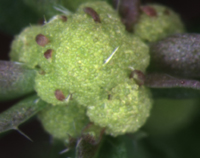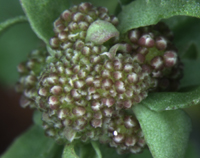Research
We have a long-standing interest in dissecting the gene regulatory networks underlying flower development. We are also studying the mechanisms that control gene expression in plants. Lastly, we are trying to translate some of our findings from basic research to crop plants. For our work, we are using a combination of genetics, genomics, bioinformatics and biochemistry. Our current projects are:
The flowering gene regulatory network
Flower development in the model plant Arabidopsis thaliana is an excellent system for studying the molecular mechanisms underlying organogenesis in plants. Extensive genetic analyses have led to the identification of many key regulatory genes of this important biological process. Most of these genes encode transcription factors or other proteins involved in the regulation of transcription, indicating the existence of a complex gene regulatory network that underlies flower development. To dissect this network, we are using genomic technologies such as next-generation DNA sequencing and proteomics in combination with a floral induction system (see pictures on the right), which allows the collection of a large number of synchronized floral buds for analysis. We are also interested in the evolution of this network and are studying how regulatory interactions have changed over time. To this end, we are using species that are closely related to Arabidopsis but whose flowers have distinct features.
Epigenetic control of gene expression
Polycomb group proteins are important epigenetic regulators of gene expression and development in eukaryotes. They modulate chromatin structure by covalently modifying histone proteins, which are tightly associated with nuclear DNA. While the basic activities of these proteins are now well understood, how they are regulated in a spatio-temporal manner remains largely unknown. To gain further insights into the function of polycomb group proteins in plants, we are studying - in collaboration with Prof. Justin Goodrich's group at the University of Edinburgh - the activity of a specific subcomplex of the polycomb repressive complex 2 in Arabidopsis.
Translational research for crop improvement
Agriculture faces many challenges through pathogens and pests, soil erosion, the effects of climate change, and a loss of biodiversity. Furthermore, modern agricultural practices are heavily dependent on the use of fertilizers and pesticides and require large amounts of fossil fuel as energy source. In order to make agriculture more sustainable and to ensure the food supply for a growing world population, new crop cultivars and farming practices are needed that generate higher yields in a resource-efficient manner. Fundamental, curiosity-driven plant research is providing the knowledge base needed for the breeding of new crop cultivars. An important part of our research program is therefore to translate some of our research findings to crops that are commercially grown in Ireland. We are currently funded by Science Foundation Ireland and the Environmental Protection Agency to generate new varieties of oilseed rape (Brassica napus) that are more resistant to insect pests. To this end, we are making use of results first obtain in Arabidopsis, which revealed how trichomes, or hairs, can be induced on the seed pods of plants (O Maoileidigh, Stewart et al. (2018)). We hope that these trichomes will protect the seed pods from being eaten by insect pests such as flea beetles, thus increasing crop yield.




